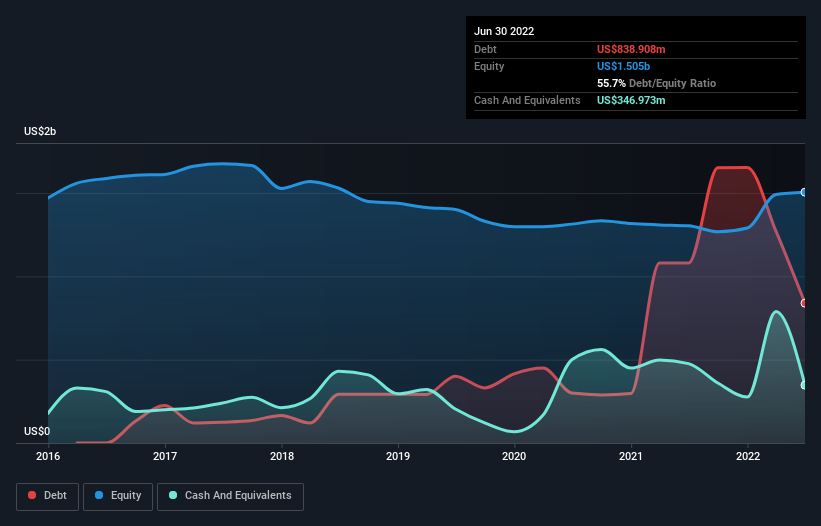- United States
- /
- Consumer Services
- /
- NYSE:ATGE
Here's Why Adtalem Global Education (NYSE:ATGE) Has A Meaningful Debt Burden

The external fund manager backed by Berkshire Hathaway's Charlie Munger, Li Lu, makes no bones about it when he says 'The biggest investment risk is not the volatility of prices, but whether you will suffer a permanent loss of capital.' When we think about how risky a company is, we always like to look at its use of debt, since debt overload can lead to ruin. As with many other companies Adtalem Global Education Inc. (NYSE:ATGE) makes use of debt. But is this debt a concern to shareholders?
When Is Debt Dangerous?
Generally speaking, debt only becomes a real problem when a company can't easily pay it off, either by raising capital or with its own cash flow. If things get really bad, the lenders can take control of the business. While that is not too common, we often do see indebted companies permanently diluting shareholders because lenders force them to raise capital at a distressed price. Of course, debt can be an important tool in businesses, particularly capital heavy businesses. The first thing to do when considering how much debt a business uses is to look at its cash and debt together.
Check out the opportunities and risks within the US Consumer Services industry.
How Much Debt Does Adtalem Global Education Carry?
The image below, which you can click on for greater detail, shows that Adtalem Global Education had debt of US$838.9m at the end of June 2022, a reduction from US$1.08b over a year. On the flip side, it has US$347.0m in cash leading to net debt of about US$491.9m.

How Strong Is Adtalem Global Education's Balance Sheet?
Zooming in on the latest balance sheet data, we can see that Adtalem Global Education had liabilities of US$417.5m due within 12 months and liabilities of US$1.11b due beyond that. Offsetting these obligations, it had cash of US$347.0m as well as receivables valued at US$81.6m due within 12 months. So its liabilities outweigh the sum of its cash and (near-term) receivables by US$1.10b.
While this might seem like a lot, it is not so bad since Adtalem Global Education has a market capitalization of US$1.86b, and so it could probably strengthen its balance sheet by raising capital if it needed to. However, it is still worthwhile taking a close look at its ability to pay off debt.
In order to size up a company's debt relative to its earnings, we calculate its net debt divided by its earnings before interest, tax, depreciation, and amortization (EBITDA) and its earnings before interest and tax (EBIT) divided by its interest expense (its interest cover). The advantage of this approach is that we take into account both the absolute quantum of debt (with net debt to EBITDA) and the actual interest expenses associated with that debt (with its interest cover ratio).
Even though Adtalem Global Education's debt is only 1.6, its interest cover is really very low at 1.3. This does suggest the company is paying fairly high interest rates. Either way there's no doubt the stock is using meaningful leverage. Importantly Adtalem Global Education's EBIT was essentially flat over the last twelve months. We would prefer to see some earnings growth, because that always helps diminish debt. When analysing debt levels, the balance sheet is the obvious place to start. But it is future earnings, more than anything, that will determine Adtalem Global Education's ability to maintain a healthy balance sheet going forward. So if you're focused on the future you can check out this free report showing analyst profit forecasts.
But our final consideration is also important, because a company cannot pay debt with paper profits; it needs cold hard cash. So we always check how much of that EBIT is translated into free cash flow. In the last three years, Adtalem Global Education's free cash flow amounted to 45% of its EBIT, less than we'd expect. That weak cash conversion makes it more difficult to handle indebtedness.
Our View
Adtalem Global Education's struggle to cover its interest expense with its EBIT had us second guessing its balance sheet strength, but the other data-points we considered were relatively redeeming. For example, its net debt to EBITDA is relatively strong. Taking the abovementioned factors together we do think Adtalem Global Education's debt poses some risks to the business. So while that leverage does boost returns on equity, we wouldn't really want to see it increase from here. The balance sheet is clearly the area to focus on when you are analysing debt. However, not all investment risk resides within the balance sheet - far from it. Case in point: We've spotted 1 warning sign for Adtalem Global Education you should be aware of.
If you're interested in investing in businesses that can grow profits without the burden of debt, then check out this free list of growing businesses that have net cash on the balance sheet.
New: Manage All Your Stock Portfolios in One Place
We've created the ultimate portfolio companion for stock investors, and it's free.
• Connect an unlimited number of Portfolios and see your total in one currency
• Be alerted to new Warning Signs or Risks via email or mobile
• Track the Fair Value of your stocks
Have feedback on this article? Concerned about the content? Get in touch with us directly. Alternatively, email editorial-team (at) simplywallst.com.
This article by Simply Wall St is general in nature. We provide commentary based on historical data and analyst forecasts only using an unbiased methodology and our articles are not intended to be financial advice. It does not constitute a recommendation to buy or sell any stock, and does not take account of your objectives, or your financial situation. We aim to bring you long-term focused analysis driven by fundamental data. Note that our analysis may not factor in the latest price-sensitive company announcements or qualitative material. Simply Wall St has no position in any stocks mentioned.
About NYSE:ATGE
Adtalem Global Education
Engages in the provision of workforce solutions worldwide.
Undervalued with moderate growth potential.


